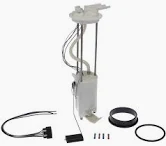A fuel pump usually fails due to a range of reasons, most of which are resulting from lack maintenance or environmental factors. One common reason is putting the vehicle along low on petrol. The other thing is that, the fuel pump sits in gasoline to keep it cool and lubricated… so when you are running down on 1/4 tank since day one of vehicle operation this also contributes to premature wear an overheating. This is a major reason why 30% of all fuel pump failures, as identified by RepairPal. As the fuel is a coolant to the pump, not enough in there can make it over heat.
Contaminated fuel is another leading cause. Water in the fuel, as well as dirt or debris can clog up just about anything from the fuel filter to damaging your pump. According to Automotive News, as much as 10 percent of fuel pump failures could be due in part to substandard gasoline or contaminants. Whether you get frost or not, a few drops of water within the fuel assistance to accumulate and corrode pump internals… this will make it effective less efficiently plus reduced life. Impurities in the pump increase friction, making the motor work harder and wear out faster.
Additionally, clogged fuel filters are an added burden to the work of your poor little fuel pump. When his filter gets blocked the pump must work excessively to draw fuel through and this adds load onto the motor. Edmunds also suggests that the fuel filter, which is part of your regular service interval at approximately 30,000 to 40,000 miles isn't replaced it could lead to premature pump failure. Failure to periodically maintain this will reduce the life of a pump by as much 40% requiring you spend money for repairs.
Another problem is electrical issues. Problems with the wiring or fuel pump relay account for about 15 percent of all fuel pump failures. An uneven voltage can make the pump work poorly and it will not deliver fuel in a uniform way. Wear on the motor over time due to this fluctuating power supply eventually leads to complete failure. Keeping the car-s electrical system well should prevent these issues.
It has been long known heat kills fuel pumps. Pumps subject to hot operating conditions, particularly those driven on a regular basis in warm climates, have these higher failure rates. An article on Car and Driver quoted a study claiming that cars operating in 95°F+ temperatures were 20% more likely to see trouble with fuel pumps. The extra heat wear out the pump components prematurely.

Pump Age – Just as with a human, most pumps come to the end of their life expectancy. Fuel pumps generally have a lifespan of 100,000 to 150,00 miles yet over time the pump's motor and parts will wear. Drivers often experience issues associated with pump failure like hard starts, stalling or lower gas mileage around this range on the odometer. Forbes reported recently more than 15% of vehicles with miles over 120,000 experienced fuel pump failure by maintaining a routine inspection you can help avoiding sudden breakdowns.
Another account of an aftermarket pump used was the reason for premature failure due to low quality. Aftermarket Replacement Parts Without OEM standards, aftermarket parts are more likely to fail due to low quality or incorrect specifications. TechAuto also claims that almost one out of 10 fuel pump replacements is repeat business because its aftermarket parts failed within a year and left frustrated vehicle owners having to fork over cash for another replacement.
For a fuel pump that is in the process of breaking it will instigate one or more from these conclusions which can result to saving time and money if you catch them before they fail. And, things like changing the fuel filter on time and always running with a reasonably full tank can serve to really extend how long your pump is going to last. To get a durable and dependable replacement, select the fuel pump with outstanding quality that will perform just like your original part Fuel Pump is considered one of those products.